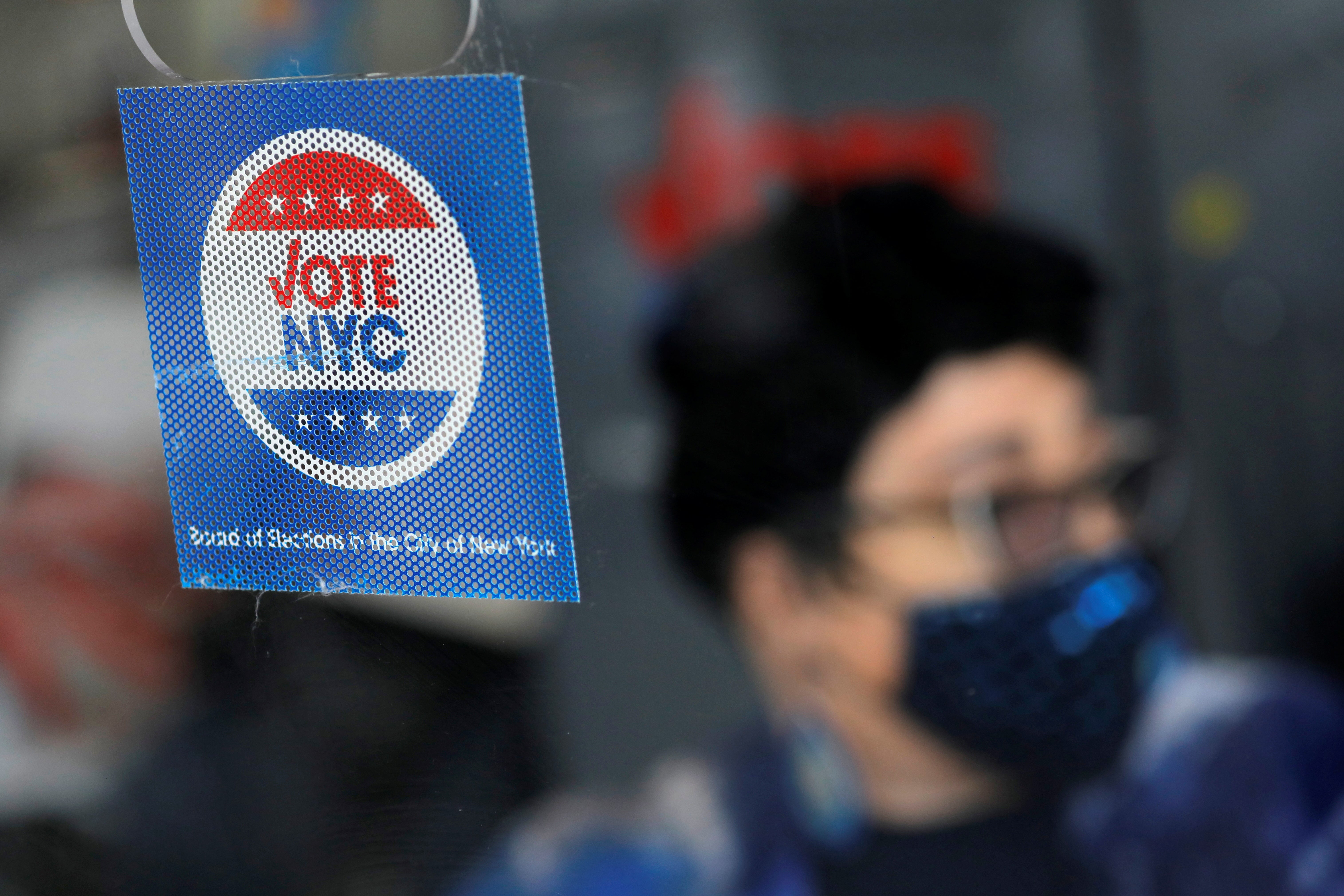NYC mayoral race reaches climax as Democratic candidates confront crime, policing and post-pandemic rebirth
Democratic primary election will determine city’s next mayor, with competing visions for police reform and reviving city devastated by Covid-19

A Democratic primary race among 13 candidates is likely to determine New York City’s next mayor, in an election that may not only reshape the mayor’s office but also the state of borough-wide leadership and progressive politics in a city recovering from a public health crisis that has magnified glaring inequities.
The primary race began at the onset of the coronavirus pandemic that killed more than 33,000 New York City residents and underscored overlapping crises in housing, unemployment, healthcare and education.
Voting closes on 22 June amid fresh optimism with relatively strong Covid-19 vaccination rates – alongside growing concerns over public safety and citywide violence, with candidates debating their competing visions for the future of the nation’s largest and most expensive police force after antiracist uprisings and calls to “defund the police” to prioritise critical social services.
In-person voting comes to a close on 22 June, but results in the city’s first-ever ranked choice election may not be revealed until next month.
That winner will face a Republican primary candidate in the fall, though the Democratic victor is likely to sweep the election in a largely Democratic-leaning city.
Who are the candidates?
Brooklyn borough president Eric Adams – a former police officer – has emerged as a frontrunner, followed by former presidential candidate Andrew Yang and former sanitation director Kathryn Garcia, who have campaigned together in the final days of the primary race.
Those candidates do not support decreasing NYPD’s budget, though the candidates have mulled strategies to reform – or transform completely – how police officers interact with the communities they serve.
Those moderate candidates face several progressive challengers, including potential front-runner Maya Wiley – a former counsel to current mayor Bill de Blasio – who has gained endorsements from the Working Families Party and New York congresswoman Alexandria Ocasio-Cortez as well as House Democratic Caucus chair Hakeem Jeffries.
Several progressive groups and lawmakers rescinded their endorsements for other progressive candidates after several campaign shakeups, including a union strike among the staff for organiser and activist Dianne Morales, and sexual misconduct allegations against Scott Stringer, the city’s comptroller once seen as a leading candidate in the race.
Those candidates have called for moving millions of dollars from NYPD’s annual budget into community programmes and crisis management efforts while investing in housing, education and other programmes to combat poverty.
How does voting work?
Several other factors have coloured the race and could shape the outcome – including impacts from the pandemic and the billionaire-backed groups supporting Mr Adams and Mr Yang, who has also faced scrutiny for significant gaps in his municipal knowledge and relative “tough on crime” approach to policing.
But the biggest change will be at the ballot box.
The primary election marks the debut of the city’s first-ever ranked-choice election, in which voters can fill ballots “ranking” their first, second, third, four and fifth choices in a race, in order of preference.
Voters will also be ranking their choices for candidates for comptroller, public advocate, city council and borough president, giving voters a wider voice in deciding their city leadership, totalling dozens of candidates.
During the final weekend for early voting, Ms Garcia and Mr Yang teamed up to promote the ranked-choice system, with Mr Yang telling voters to support his rival in the No 2 spot.
Surrogates for Mr Adams’ campaign – dogged by accusations that the Brooklyn borough president doesn’t live there, among several other transparency and ethics controversies facing his campaign – accused his opponents of engaging in “voter suppression” and a “cynical attempt” to “disenfranchise Black voters” with a “backroom deal” political manoeuvre that will deprive voters of colour from electing a Black candidate to City Hall.
The last-minute threats – appearing to undermine both the highly favoured ranked-choice system and Democrats’ battle against Republicans’ nationwide suppression efforts – faced immediate backlash.
Ranked-choice voting advocacy groups criticised the comments from the Adams’ campaign, saying that there is “nothing insidious or cynical about two candidates transparently using a legitimate strategy in a democratically approved system of election.
“Candidates should keep their criticism to the issues, rather than mischaracterizing a strategy that is available to all who choose to use it,” according to a joint statement from Common Cause New York and Rank the Vote NYC.
When are the results?
After polls close, elections officials will provide some early (and unofficial) returns revealing how voters on Election Day and during the early voting period ranked their first choices.
If no candidate wins 50 per cent or more outright in those first-choice results, the outcome of the race might not be revealed until several weeks later.
Election officials will finish processing ranked picks on 29 June, and it could take up to 12 July – after processing all absentee ballots – to determine the winner.
But results on 22 June will reveal overall in-person turnout, indicating how much “enthusiasm” or the limits of voter access and outreach during the pandemic in a competitive primary.
More than 200,000 voters requested absentee ballots, and nearly 200,000 voters cast their ballots during the early voting period that ended on 21 June, according to the Board of Elections.
The Republican primary has drawn two candidates – Curtis Sliwa and Fernando Mateo – though they face unlikely prospects in a city dominated with Democratic-leaning voters.
The winners from each party’s primary will face off in a general election on 2 November.
Join our commenting forum
Join thought-provoking conversations, follow other Independent readers and see their replies
Comments
Bookmark popover
Removed from bookmarks